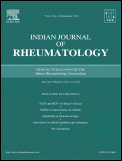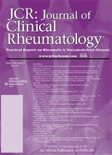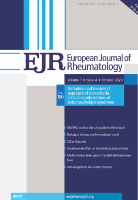
Indian Journal of Rheumatology
Scope & Guideline
Exploring the frontiers of rheumatologic care and research.
Introduction
Aims and Scopes
- Clinical Research in Rheumatology:
The journal publishes clinical studies that investigate various rheumatic diseases, focusing on their diagnosis, treatment, and management, particularly in the Indian context. - Epidemiology of Rheumatic Diseases:
Research exploring the prevalence and epidemiological trends of rheumatic diseases in India, addressing how these conditions affect different demographics and regions. - Innovative Therapeutic Approaches:
Papers discussing new and existing therapeutic modalities, including biologics and targeted therapies, as well as traditional treatment approaches tailored for Indian patients. - Diagnostic Advances:
Studies that focus on improving diagnostic accuracy and methodologies in rheumatology, including the use of imaging techniques and biomarkers. - Patient-Centered Outcomes and Quality of Life:
Research assessing patient-reported outcomes, quality of life, and psychosocial aspects of living with rheumatic diseases, with an emphasis on Indian populations. - Health Economics and Policy:
Investigations into the economic burden of rheumatic diseases and the impact of health policies on patient care and access to treatment. - Education and Training in Rheumatology:
Contributions focusing on improving education and training for healthcare professionals in the field of rheumatology, including the introduction of new technologies and methodologies.
Trending and Emerging
- Digital Health and Telemedicine:
There is a growing emphasis on research related to telemedicine and digital health solutions, especially following the COVID-19 pandemic, indicating a shift in how rheumatology care is delivered. - Artificial Intelligence and Machine Learning in Rheumatology:
The integration of AI and machine learning technologies for enhancing diagnostics and treatment plans is gaining traction, showcasing a forward-thinking approach in rheumatology. - Long COVID and Its Impact on Rheumatic Diseases:
Increasing publications addressing the intersection of COVID-19 and rheumatic diseases, particularly in relation to long-term outcomes and management strategies. - Patient-Centered Care and Quality of Life Studies:
A notable rise in research focusing on patient experiences, adherence to treatment, and quality of life metrics, emphasizing the importance of holistic approaches in rheumatology. - Health Economics and Access to Care:
Emerging themes on the economic implications of rheumatic diseases, including cost-effectiveness and healthcare access issues, are becoming more prominent within the journal. - Biomarkers and Precision Medicine:
Studies investigating novel biomarkers for early diagnosis and personalized treatment plans are increasingly featured, reflecting advancements in precision medicine.
Declining or Waning
- Traditional Treatment Modalities:
Research focusing on conventional treatments without the integration of new therapeutic advancements appears to be decreasing, as the field increasingly shifts towards innovative and targeted therapies. - Basic Science Research:
There has been a noticeable decline in studies centered on fundamental biological mechanisms of rheumatic diseases, as the journal emphasizes more clinical and applied research. - Rare Disease Reports:
Papers detailing rare rheumatic conditions or atypical presentations have become less frequent, possibly due to the broader focus on more prevalent diseases that impact larger populations. - Historical Perspectives in Rheumatology:
Articles reflecting on the historical evolution of rheumatology practices and treatments are less common, indicating a shift towards contemporary issues and future directions. - Case Reports:
The volume of detailed case reports has decreased, as the journal moves towards publishing more comprehensive studies with larger sample sizes and broader implications.
Similar Journals

RHEUMATOLOGY INTERNATIONAL
Transforming understanding through rigorous research.Rheumatology International, published by Springer Heidelberg, is a prestigious journal that focuses on innovative research in the field of rheumatology and immunology. Established in 1981, this peer-reviewed journal has contributed significantly to advancing our understanding of autoimmune disorders, clinical approaches, and therapeutic interventions. It holds a commendable Q2 ranking in the categories of Immunology, Immunology and Allergy, and Rheumatology as of 2023, showcasing its influence and importance within these disciplines. With a robust Scopus ranking—positioned 14 out of 73 in Medicine Rheumatology—it caters to a diverse audience of researchers, clinicians, and students committed to improving patient care and treatment modalities. Although it does not currently offer open access options, the journal remains a vital resource for insights on contemporary challenges and breakthroughs in rheumatological research, published from its base in Heidelberg, Germany.

Journal of Rheumatic Diseases
Leading the way in innovative therapeutic strategies and diagnostics.Journal of Rheumatic Diseases, published by the Korean College of Rheumatology, stands as a pivotal platform in the field of rheumatology, contributing significantly to the advancement of knowledge and clinical practice since its inception. With an impact factor reflecting its esteemed position in the academic community, this open-access journal promotes accessibility to high-quality research, ensuring that groundbreaking discoveries are reachable to all stakeholders in the realm of rheumatic diseases. The journal has maintained its commitment to quality, evidenced by its ranking in the Q3 category for Rheumatology in 2023, and its presence among the top quartiles of medical research. Focusing on innovative therapeutic approaches, emerging diagnostic techniques, and comprehensive reviews, the Journal of Rheumatic Diseases seeks to foster collaboration and dialogue among researchers, clinicians, and students alike. For accessibility, the journal offers numerous articles since its transition to open access in 2017, thereby facilitating research dissemination across the globe. As it converges over the years from 2019 to 2024, the journal promises to be instrumental in shaping the future of rheumatic disease research, inviting contributions that inspire new frontiers in this essential field.

JCR-JOURNAL OF CLINICAL RHEUMATOLOGY
Exploring New Frontiers in RheumatologyJCR-Journal of Clinical Rheumatology, published by Lippincott Williams & Wilkins, is a premier outlet dedicated to the field of rheumatology, recognized for its contributions and relevance among medical journals. Boasting an impact factor reflective of its vital role in disseminating innovative research, it currently holds a Q2 category ranking in Medicine (miscellaneous) and a Q3 ranking in Rheumatology as of 2023. With its convergence years spanning from 1995 to 2024, the journal aims to foster the advancement of knowledge in clinical practices, therapeutic advances, and patient management strategies concerning rheumatic diseases. Researchers, professionals, and students can access a wealth of benchmark studies and peer-reviewed articles, enhancing their understanding and collaboration within this dynamic field. By bridging clinical insights with rigorous research, the JCR-Journal of Clinical Rheumatology remains an important resource for advancing the understanding of rheumatologic disorders and improving patient care.

CLINICAL AND EXPERIMENTAL RHEUMATOLOGY
Championing rigorous research in rheumatological sciences.CLINICAL AND EXPERIMENTAL RHEUMATOLOGY is a prestigious journal published by CLINICAL & EXPER RHEUMATOLOGY, dedicated to advancing the field of rheumatology and immunology. With a rich history dating back to 1983, the journal serves as a critical platform for researchers, clinicians, and professionals seeking to disseminate and discuss innovative findings in these rapidly evolving areas. Featuring an impressive Q2 ranking in both Immunology and Allergy, as well as Rheumatology, this journal is recognized for its high-quality contributions, placing it among the top tier of academic publications. Operating without an open access model, CLINICAL AND EXPERIMENTAL RHEUMATOLOGY is headquartered in Pisa, Italy, and publishes articles that undergo rigorous peer review to ensure excellence in research. This journal is an invaluable resource for those dedicated to improving patient outcomes through evidence-based practice in rheumatology, immunology, and related fields.

Arthritis & Rheumatology
Fostering Insights for a Healthier TomorrowArthritis & Rheumatology is a leading journal dedicated to the advancement of knowledge in the fields of rheumatology, immunology, and allergy. Published by WILEY in the United Kingdom, this prestigious journal boasts an impressive impact factor and a prominent reputation, ranking in the Q1 category across multiple disciplines, including Immunology and Rheumatology. With its high ranking of 4th out of 73 in Rheumatology and notable standings in related fields, it serves as a crucial platform for researchers, healthcare professionals, and scholars to disseminate groundbreaking findings. The journal embraces an Open Access model, enhancing the accessibility of vital research to a global audience and ensuring that knowledge dissemination is maximized. Since its inception in 2014, Arthritis & Rheumatology has been at the forefront of impactful research, fostering collaboration and innovation in tackling complex challenges within these medical disciplines. Researchers looking to explore the latest advancements and engage with cutting-edge studies in these fields will find this journal to be an essential resource.

European Journal of Rheumatology
Leading the Charge in Rheumatological AdvancesEuropean Journal of Rheumatology is a premier, peer-reviewed journal that has been paving the way for innovative research and in-depth analysis in the field of rheumatology since its launch. Published by AVES, this Open Access journal has been accessible to researchers, professionals, and students worldwide since 2014, promoting the sharing of valuable knowledge on rheumatic diseases and their treatment. With an ISSN of 2147-9720 and an E-ISSN of 2148-4279, it provides a prominent platform for groundbreaking studies and clinical evaluations that bridge scientific discovery with practical application. The journal’s mission is to enhance the understanding of rheumatological conditions and facilitate advancements in therapeutic strategies, making it an essential resource for anyone devoted to the improvement of patient care in this dynamic field. The European Journal of Rheumatology is committed to upholding the highest standards of scholarly publishing and aims to foster collaboration among researchers and practitioners across Europe and beyond.

ZEITSCHRIFT FUR RHEUMATOLOGIE
Connecting researchers and clinicians for better rheumatic disease outcomes.ZEITSCHRIFT FUR RHEUMATOLOGIE, published by Springer Heidelberg, serves as a vital platform in the field of rheumatology, providing researchers, clinicians, and students with cutting-edge findings and discussions related to the diagnosis, treatment, and management of rheumatic diseases. Since its inception in 1974 and continuing until 2024, this journal retains its commitment to disseminating significant scientific work within this specialized domain. Although it is currently categorized in the Q4 quartile for Rheumatology and ranks 47 out of 73 in Scopus, reflecting its burgeoning presence, the journal is dedicated to evolving and gaining prominence in the academic community. By offering valuable insights and fostering scholarly discourse, ZEITSCHRIFT FUR RHEUMATOLOGIE plays a crucial role in advancing rheumatology research and enhancing patient care practices worldwide. The journal presents an opportunity for its readers to engage with contemporary studies and enrich their understanding of rheumatic ailments.

AKTUELLE RHEUMATOLOGIE
Connecting researchers to advance the field of rheumatology.AKTUELLE RHEUMATOLOGIE is a prominent German journal published by GEORG THIEME VERLAG KG, dedicated to advancing the field of rheumatology. Since its inception in 1978, this peer-reviewed journal has been a vital resource for professionals, researchers, and students engaged in the study and treatment of rheumatic diseases. With an ISSN of 0341-051X and an E-ISSN of 1438-9940, the journal provides a platform for sharing groundbreaking research, clinical studies, and reviews. Although classified in the fourth quartile (Q4) of rheumatology journals and ranked 67 out of 73 in its category according to Scopus, AKTUELLE RHEUMATOLOGIE continues to contribute to the discourse in rheumatology. Its comprehensive coverage of recent advancements and innovative approaches makes it an essential publication for anyone interested in the latest developments in the field.

Rheumatology Advances in Practice
Unlocking the future of rheumatology, one article at a time.Rheumatology Advances in Practice, published by Oxford University Press, is a vital open-access journal dedicated to advancing research and education in the field of rheumatology. With an E-ISSN of 2514-1775 and an impressive open access model established since 2017, this journal facilitates the dissemination of cutting-edge knowledge and innovative practices to a global audience. It has garnered recognition within the academic community, holding a Q3 classification in Rheumatology for 2023, which reflects its contribution to the evolving landscape of rheumatological research. The journal aims to present high-quality, peer-reviewed articles that explore the latest findings, advancements, and clinical applications in rheumatology, making it an essential resource for researchers, healthcare professionals, and students alike. By bridging the gap between research and practice, Rheumatology Advances in Practice plays a significant role in improving the care of patients with rheumatological conditions, promoting evidence-based approaches to clinical challenges.

BMC Rheumatology
Advancing knowledge in rheumatology without barriers.BMC Rheumatology is a vital open-access journal that has been disseminating high-quality research in the field of rheumatology since its inception in 2017. Published by Springer Nature, this journal provides a platform for original research, reviews, and clinical studies that advance the understanding and treatment of rheumatic diseases. With a commendable impact factor and ranked in the second quartile (Q2) for Rheumatology as of 2023, BMC Rheumatology exemplifies expertise, contributing significantly to the medical community's dialogue. Researchers, professionals, and students will find valuable insights within its pages, as it caters to a diverse audience through its commitment to open-access publishing, facilitating knowledge sharing without barriers. Based in the United Kingdom and indexed in Scopus, the journal continues to thrive with a steady convergence of academic excellence through 2024, making it an indispensable resource for those dedicated to advancing rheumatological science.